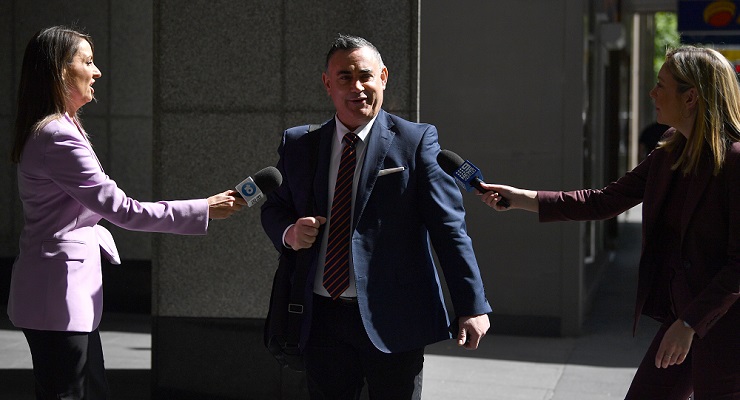
If politicians in Canberra and all the states and territories haven’t been paying close attention to the saga of the John Barilaro appointment in NSW, they should be.
The scandal is death-by-a-thousand-cuts stuff, with new information emerging every day. The evidence of senior bureaucrat Amy Brown yesterday to a Legislative Council inquiry was particularly damaging to NSW Premier Dominic Perrottet, who’d claimed both that no suitable candidate had been identified for the job — Brown says in fact she congratulated successful candidate Jenny West, who had “exceeded expectations”, before Barilaro’s office got her to rescind the offer of the New York posting — and that there was no ministerial involvement in the decision.
All coverage of the state government’s budget has been blown away. No one’s talking about the massive investment in childcare or healthcare or the long-term transition to universal pre-kinder. It’s all jobs for mates.
It demonstrates two things: the public tolerance of jobs for mates is now at an all-time low, and any process of appointment of a mate to a public sector job, when exposed to the cold light of day, will look shonky at best — or much worse.
Much of this is the legacy of the Coalition government, the most corrupt in Australian federal history, and its unabashed eagerness to appoint mates to any position it could find — most egregiously the Administrative Appeals Tribunal (AAT), which is now wholly discredited by a long list of appointments of Coalition mates, starting back under George Brandis in the Abbott years.
Scott Morrison in particular took the standard but widely tolerated examples of political misconduct of the last three decades — pork-barrelling, jobs for mates, political lying, politicisation of the public service, opposing scrutiny — and turned them into central elements of his entire political strategy, dialling all of them up to 11, until integrity and his own reputation for lying became central issues of the 2022 election.
Morrison has made all of this deeply unacceptable. Every other government is now on notice.
Labor in Canberra has no option but to abolish the AAT. It cannot be regarded credibly ever again unless, somehow, it is purged of every Coalition appointee, which can’t happen under existing legislation. The whole tribunal has to be abolished and a new one established in its place, with qualified appointees — not partisan hacks, failed MPs and Liberal and National mates.
But the AAT is just the symptom of a bigger problem: the discretionary role that government ministers have in relation to appointments.
It’s the same problem as pork-barrelling and ministerial discretion in relation to grants. Governments — most especially the Berejiklian-Barilaro government and the Morrison government — proved that politicians can no longer be trusted to exercise their discretion over grant allocation in the public interest. Instead, they exercise it in their partisan interests. Ditto with appointments to public bodies.
For those hoping Labor in Canberra will take a more public interest-focused approach to public appointments, their optimism may prove justified (the Rudd government, driven by John Faulkner, actually walked the walk on integrity). But that won’t change a broken system.
The Centre for Public Integrity today called for a proper Public Appointments Framework, that would lock politicians out of public appointments. The framework would:
- strengthen the current Commonwealth Merit and Transparency Policy to require clear criteria and minimum eligibility thresholds, public advertising of vacancies, independent selection panels and a requirement that appointments only be made on the basis of panel recommendations;
- require that the policy be legislated and widened to all public appointments;
- ensure the whole thing be monitored by a joint cross-party parliamentary committee;
- make sure that departmental secretaries are much more difficult to sack, and only on legislated grounds, and;
- recommend that the AAT be abolished and replaced.
Removing the role of politicians from appointments and giving the job to independent panels would go a long way to addressing not merely the symptoms of the problem, but the problem itself.
Now is the time to move for the federal government — and any other government paying attention.








Crikey is committed to hosting lively discussions. Help us keep the conversation useful, interesting and welcoming. We aim to publish comments quickly in the interest of promoting robust conversation, but we’re a small team and we deploy filters to protect against legal risk. Occasionally your comment may be held up while we review, but we’re working as fast as we can to keep the conversation rolling.
The Crikey comment section is members-only content. Please subscribe to leave a comment.
The Crikey comment section is members-only content. Please login to leave a comment.